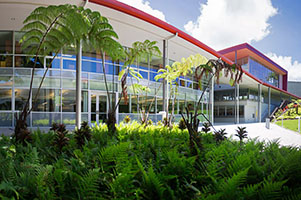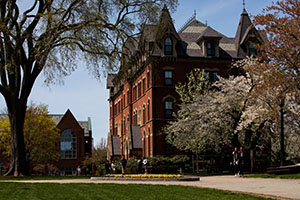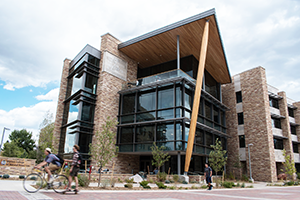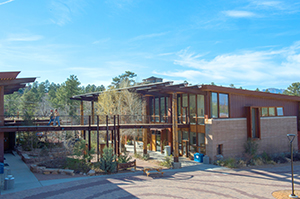We wanted to help you learn more about graduate programs in environmental fields. So we asked former students to write firsthand accounts of their graduate program experience.
You can also learn more by searching our directory of 1,300+ environmental Master's, PhD, and Certificate programs.
Read the program reviews below to gain insight into environmental graduate programs across the United States and abroad.
Program Reviews
UNIVERSITY OF HAWAI'I AT HILO | Conservation Biology & Environmental Science - MS
UNIVERSITY OF FLORIDA | Forest Resources and Conservation - MS
WEST VIRGINIA UNIVERSITY | Wildlife and Fisheries Resources - MS
TUFTS UNIVERSITY | Conservation Medicine - MS
MONTCLAIR STATE UNIVERSITY | Marine Biology and Coastal Sciences - MS
COLORADO STATE UNIVERSITY | Human Dimensions of Natural Resources - MS
UNIVERSITY OF WISCONSIN-MADISON | Environmental Conservation - MS
PRESCOTT COLLEGE | Environmental Studies - MS
BOWLING GREEN STATE UNIVERSITY | Biology - MS
VRIJE UNIVERSITEIT BRUSSEL | Marine and Lacustrine Science and Management - M.Sc.
Have you graduated?
Tropical Conservation Biology and Environmental Science - MS
UNIVERSITY OF HAWAI'I AT HILO | Hilo, HI

"I am writing from my experience in the Tropical Conservation Biology and Environmental Science masters program at the University of Hawaii at Hilo. I participated in the internship track, although this program offers both internship and thesis routes. If you are thesis you need to have an advisor before you start the program and form a committee in your first year. So if you are looking that route, I suggest you reach out to professors and labs as you turn in your application. The internship route gets appointed one advisor for the whole internship track and you gain mentors as you start working with your internship organization.
My first year in the internship program was the first year they revamped the requirements. You are required to take 10 internship credits of courses and complete a 600 hour professional internship experience alongside your course load totaling 36 credits. When you get accepted to the program, and in your first year, you work with the advisor to find an internship organization. Your internship can be on island, or abroad. I would start looking up organizations and make connections asap when you are applying, as some students found it harder than others to find an internship after their first semester.
Overall, I was happy with my experience. I got to learn about Hawaii's culture and ecosystems while earning my masters degree in two years.
This track is great for people who want to be natural resource managers. If you want to be a researcher or professor, I suggest the thesis route.
At times this experience was frustrating being the first cohort to go through the new program. Now that this will be the 3rd year of the revamped program, some formatting and issues have been adjusted or brought to light to benefit the students. If you are looking to go this route, my advice would be: 1. Be your own advocate, get your name out there, and be open to opportunities, 2. Respect Hawaiian culture and land, and do your best to educate yourself before coming to Hawaii, 3. Get funded, out of state tuition is CRAZY expensive (over 1,000 a credit) so search for scholarship and funding opportunities beforehand."
- Student Graduate | 2020
Wildlife and Fisheries Resources - MS
WEST VIRGINIA UNIVERSITY | Morgantown, WV
"My experience at WVU as a grad student from 2015-2017 was very positive. I found the program fairly robust and was able to complete a graduate certificate in GIS and Spatial Analysis in addition to my M.SC. A definite bonus as my undergraduate school didn't provide exposure to GIS applications for resource Management.
The faculty were fair and worked with students to balance their scholastic and research commitments.
My advisor Jim Anderson was hands off in a good way for me. He allowed me to pursue my project on my own and left it up to me to initiate check-ins and seek resources. He also took me on with no funding and allowed me to create my own project, helped me find funding, and placed me as a TA in a separate department to make sure I was financially supported. He also supported me to attend conferences both internationally and nationally. This mentorship worked well for me and I loved having Jim as an advisor.
My favorite thing about the program was my cohort. We had a great group dynamic and among the wildlife, fisheries, and forestry grad students. There was no competitive nature among us and we supported each other through coursework, assisted on each others' research, and spent a lot of time together socially. The school has a chapter for the Wildlife Society, American Fisheries, and Society for Conservation Biology which were open for both undergrad and graduate students alike to participate in.
Overall I felt that the courses I took supported me in my professional career and I have built a strong network through my time and experience with the WVU Wildlife and Fisheries Resources Department."
- Program Student | Graduated 2020
Forest Resources and Conservation - MS
UNIVERSITY OF FLORIDA | Gainesville, FL
"I received my masters of science online through UF in Forest Resources and Conservation/Natural Resource Policy (non-thesis) and I felt it was a great choice for me. Although the program was non-thesis, I did have the opportunity to write a substantial research paper in lieu of a final exam. My advisory board was extremely supportive and even helped me edit my paper so that I might one day be able to publish it. I was also given many opportunities to travel to campus in order to help with hands-on research, teaching experiences, and special summer courses in the field.
By pursuing an online degree, I was able to continue living and working part-time were I was. I was also able to save a ton on tuition as the distance program allows students to pay an in-state tuition rate. Plus, with all necessary coursework online I was able to create a flexible schedule that worked best for me and the education I received was amazing. Within this program you are also able to pursue a concentration in several areas of study such as policy, GIS and technology, and aquatic sciences.
Overall I would highly recommend this program to place-bound students or anyone looking to pursue a higher degree without having to dedicate their entire life (or bank account) to it.
The education I received was on par with other masters programs and I had no trouble finding a higher paid position upon graduating."
- Student Graduate | 2019
Conservation Medicine - MS
TUFTS UNIVERSITY | Medford, MA
 "I received my masters of science in Conservation Medicine at the Cummings School of Veterinary Medicine at Tufts. While this degree is non-thesis you still have a case study or research paper to present which can be upwards of 40 pages, but you also have the option to do your own original research and submit this for publication. There are a variety of opportunities to collaborate on research projects if you are looking to be published, you can also audit and take classes that the veterinary students are taking if you are interested. There are also a lot of laboratories that are happy to have students that are eager to learn.
"I received my masters of science in Conservation Medicine at the Cummings School of Veterinary Medicine at Tufts. While this degree is non-thesis you still have a case study or research paper to present which can be upwards of 40 pages, but you also have the option to do your own original research and submit this for publication. There are a variety of opportunities to collaborate on research projects if you are looking to be published, you can also audit and take classes that the veterinary students are taking if you are interested. There are also a lot of laboratories that are happy to have students that are eager to learn.
The faculty is very receptive and they give you their full attention while you are a student. You are also required to do an externship and work in the field for 4-6 weeks. This is usually something that is your choice and helps you hone in on your personal interests.
Some students use this opportunity to go abroad and work with a particular species or a particular topic that highlights their passion.
Overall the Conservation Medicine Program is One Health focused. This program is about a year or so long and is very immersive but there are opportunities for hands-on training both in the laboratory and in the field that are integrated into your curriculum. The schedule does allow you to work part-time while you are matriculated but I would suggest waiting, if possible, until the second half of the program before exercising that option.
I was a non-traditional student and the cohort is comprised of roughly 18 students that vary in ages and disciplines. In the past, the range of students have been anything from veterinarians from other countries to students right out of completing their undergraduate degree. The curriculum has a great GIS course and you grow to become very comfortable with making maps very early on even if you have little to no experience.
I enjoyed the experience and was able to find work before officially graduating. Much like any program, this program is what you make of it and how driven you are to seek out opportunities and build your skills. Overall, the Conservation Medicine program has given me the tools to be more competitive in the field of conservation Medicine."
- Program Student | Graduated 2019
Marine Biology and Coastal Sciences - MS
MONTCLAIR STATE UNIVERSITY | Montclair, NJ
"The program was originally called Aquatic and Coastal Sciences. It's a fairly new program only started by one professor in the 2000s.
That being said if you don't align with the professor's research studies, you would have a harder time doing the program. Let's just say our whole curriculum only had a couple mandatory biology and marine biology course, mostly environmental science courses. Even the marine biology courses were mainly focussed on the different overall water ecosystems, not even going that specific in any marine life. It definitely changes your perspective and outlook on what you want to do in the future! It allows you more options when you are looking for jobs. From my point of view, it seems that the whole university is concentrating more on building up its environmental science programs than it is marine biology. Now, it's slowly gaining momentum by having more people applying and one more professor joining the program!
In conclusion, I guess the reason why the program is not as "on par" as other programs is because the university in not near a huge body of water and the job market up here in the Northeast is either geared towards science education or environmental consultancy.
In all, if you are the person that thinks with a bigger picture in mind and would like to dabble into other disciplines then this school can be for you!"
- Program Student | Graduated 2019
Human Dimensions of Natural Resources - MS
COLORADO STATE UNIVERSITY | Fort Collins, CO
 "Overall I had a very good experience at Colorado State University. I received my MS from this program in 2004 when the department was called Natural Resources Recreation and Tourism. They have since changed their name to Human Dimensions of Natural Resources. When I attended, the department was heavily focused on natural resource recreation and protected area management. I think the department has further diversified since it changed names but my understanding is that it’s still very strong in these areas.
"Overall I had a very good experience at Colorado State University. I received my MS from this program in 2004 when the department was called Natural Resources Recreation and Tourism. They have since changed their name to Human Dimensions of Natural Resources. When I attended, the department was heavily focused on natural resource recreation and protected area management. I think the department has further diversified since it changed names but my understanding is that it’s still very strong in these areas.
This department is housed within CSU’s College of Natural Resources which is great because it also includes very strong departments in forestry, wildlife biology, and other fields. So as a grad student, I got access to a wide range of high quality courses and faculty across the fields of natural resources. For me, this was helpful because I had no background at all in ecology or natural resources before starting the program. And I was able to get broad exposure to a variety of topics both within the department and outside.
It helped me figure out what I was interested in and prepared me for multiple job pathways which my career ultimately took.
I completed my Masters in 2 years but I combined my schooling with 2 years in the Peace Corps as part of the Masters International program. This was an option of the program and Peace Corps at the time - I’m not sure if it’s still available. There wasn’t much practical benefit of combining my Master’s and the Peace Corps other than the timing worked better for me."
- Program Student | Graduated 2004
Environmental Conservation - MS
UNIVERSITY OF WISCONSIN MADISON | Madison, WI
"This program really packs a lot of information into a small amount of time! If you do your due diligence and keep up with the readings (which can be extensive), you can learn a lot in the 15-months you'll spend here. Just be ready to dedicate a lot of time to coursework, because the three semesters that you spend taking classes will be busy.
As is the case with many graduate programs (I suspect), some classes teach more useful skills than others.
I found the Conservation Planning and GIS courses to be some of the most challenging yet most valuable courses available to students.
This is a cohort-based leadership program, so you will spend a lot of time working with the ~30 other students in the program with you. I really enjoyed the support and diversity of viewpoints this structure offered.
Opportunities to specialize in this program are limited, as you only have two elective courses you can choose and the rest are all required for the program. So if you're looking for something that will let you dig into a specific research question or discipline, I would recommend exploring some thesis-based options.
What this program offers is a set of practical skills that you will get to put into practice during your last summer semester, when you join a conservation organization somewhere in the world to complete a capstone project (this is another opportunity to specialize, as you have a decent amount of input in choosing where you go).
The one cautionary note I would offer is that some of the classes are pretty easy if you approach them from a homework standpoint, and it can be tempting to skate through. Don't - you'll get out exactly what you put in. Overall, I enjoyed my time in the program and grew professionally as a result of attending."
- Program Student | Graduated 2020
Environmental Studies - MS
PRESCOTT COLLEGE | Prescott, AZ (Online)

"I transferred to Prescott at the end of my degree program, attending one semester of classes and one semester to write my capstone. Everyone I spoke to and worked with genuinely desired my success, and both faculty and administration answered my many questions in a timely manner. In my capstone experience, they are very flexible in guidelines and requirements. So much so that I thought the process was too easy at times. The department was revising their guidelines during my time there, but I received conflicting information on the requirements and submission process and was never given nor could find a concise list of directions for the capstone process. That being said, they did work with me and I submitted and graduated without any issues."
- Program Student | Graduated 2020
Biology - MS
BOWLING GREEN STATE UNIVERSITY | Bowling Green, OH
"I attended Bowling Green State University (BGSU) from 2018 to 2020 pursuing a MS of Life Sciences. BGSU is a middle sized college in Northwest Ohio where there are lots of research opportunities and the majority of graduate students are paid to go in exchange for Research Assistantships or Teaching Assistant positions. There is a lot of money in water quality research (as well as Ichthyology opportunities) due to many grants being established after the toxic algal bloom in Lake Erie in 2014 which shut off water access to Toledo. There are many opportunities for land based research based on the rare ecosystem of the Oak Openings nearby, especially regarding the endangered Karner Blue Butterfly. There are also sizable opportunities for microbiology research at BGSU but as an ecologist, I did not have much crossover or experience with the people in those programs and am unqualified to talk about the quality of said programs.
While this school is very good for students to not go into debt while attending, I had a very mixed experience there. Being a Teaching Assistant can be immensely frustrating due to poor communication if you teach some of the entry level courses, and some Faculty members expect you to take on multiple research roles past your graduation research if you are a Research Assistant which should not be the case. I have only the nicest things to say about fellow graduate students I work with but many of the faculty at BGSU have problems with elitism, minimal Ivory Tower perspective, and can be openly verbally abusive. There are many excellent faculty members, but it is not wrong to say the worst experiences color the rest of your time there.
I am thankful for the opportunity to graduate without further debt, but in my own, highly specific situation, had a very negative experience at BGSU. I give my personal experience at BGSU a 3/10 but recognize the majority of students in the program probably have a 7-8/10 experience. Parts of what lead to my negative experience was that I switched advisers at the end of my first year due to disproportionate, unwarranted verbal abuse. It is something where I was unable to do due diligence research about the adviser and research opportunity available as I was working a minimum wage retail job and could hop into grad school in 2 weeks or work retail for another year. Warning signs were there (other students told me to never share anything personal with my adviser as it would be used as a guilt bargaining tool), but I chose to ignore them as I believed I could make it work.
If I could go back in time, I would have waited another year, but hindsight is 20/20 and it was the right decision at the time. I would wager the vast majority of students with positive experiences did not sort of fall into the position like I did. I know students who did have negative experiences in normal situations (especially when they are appointed a committee member they don't get along with), but like I said, i'd say the average graduate student has a 7-8/10 experience. I do believe my 3/10 is the exception and not the rule at BGSU."
- Program Student | Graduated 2020
Marine and Lacustrine Science and Management - M.Sc.
VRIJE UNIVERSITEIT BRUSSEL | Brussels, Belgium
"Length: 2 years, about 1.5 years of classes and a full-length European thesis (~10 pages - like a paper submission)
Pros: First and foremost, tuition is dirt cheap. Even as a non-EU international student tuition is about $2,000/year. Second off, the program has a wide range of available courses and spans a ton of topics. You can choose between 4 focuses (Global Change Impacts on Ecology and Biodiversity, Conservation Biology and Ecosystem Management, Environmental Impact and Remediation, Marine and Lacustrine Geosciences). For the thesis you have almost unlimited options between the 3 universities and multiple departments involved. The program (aside from COVID19 in 2020) is super hands-on. Multiple weeks on a Belgian government RV, probably 10-15 educational field work trips each year and a week on the North coast of France learning coastal ecology field techniques. We missed it this year but, most years this is a huge selling point of the program.
Cons: Studying in Europe is different. While graduate students in the US are treated like junior-faculty, grad students in Europe are treated more like advanced students. There is a lot less guidance and there is little to no communication. For this program in particular, the program directors are a little in over their head and can't handle the students they have in their program. It's sort of a "one-size-fits-all" feel which sucks. Also, Belgian students (and Dutch students) are treated as sort of superior to other international students - a complaint common among Belgian universities.
Conclusion:
Overall, VUB's Oceans and Lakes is a good option if you want to prepare yourself for a PhD in Marine Sciences, ecology, wildlife science etc, but also want to take advantage of an opportunity to live and study in Europe.
If you are easily upset by having a lack of communication, organization and often inefficient structure, this program probably isn't for you. If you are self-sustaining and you can push through that kind of thing, this program has a lot of perks."
- Program Student
Have you graduated?


